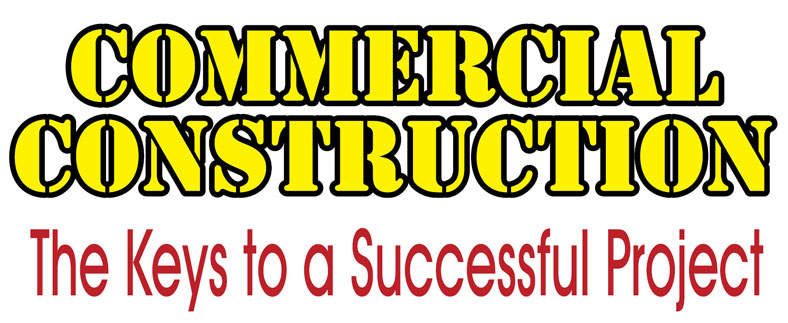Undertaki
Working with a General Contractor
Choosing the right general contractor is probably the largest determining factor on whether or not your project will be a successful one. Not only will they be spearheading the project for you and handling subcontractors, but they are also a wealth of information and advice as the best contractors have the experience, training and knowledge to problem-solve and think outside the box to make sure your project as a success.
Scott Elley with Lund-Ross Constructors advises, “First off, you need to understand the scope of the project, how the building will be used, who will inhabit the building and their special needs and how the building will be used. From warehouse to office space, each require a specific understanding of site location, specific needs and more. You also need to think about what image you want your building to portray to your staff and clients. If it is to be a negotiated project with the general contractor, then these questions and many more can be addressed with them. If it is a bid situation with numerous general contractors bidding on the project, there will be varying estimates on the construction of the project. Remember, the low bid doesn’t always equal the best contractor being awarded the project. A client should look for a balance between the cost of the project and the amenities as this will result in the best value for the client.”
He goes to offer thes
Jerry Huismann with Lacy Construction also has some pointers from his experience as the president of a general contracting business. “When undertaking a commercial construction project, the first thing you need to do is define your goals for the project: What will you be able to do when this project is complete? Can I accomplish this by any other means? How much time do I want to spend with this project? You should also select a builder early and talk to their references. Your builder should be a great source of information, such as latest materials and methods. When choosing a builder, you should go with one you trust. A builder with integrity will go much further than a lengthy contract. To find one you can trust, talk to others in your industry, the Chamber of Commerce and your business advisors. Once you have a list, meet with the potential builders and talk to their past clients about their experience. At the end of the day, the builder you choose should represent your best interests, even at their expense. At Lacy, we strive to find repeat customers and we do this by treating them with respect and courtesy. We have the experience, systems and capabilities to do it right each and every time. You can be assured of having the best every time we build for you.”
One thing you may consider is going with a general contractor who has experience with the type of project you are having built (especially if it is industry-specific, such as a church, healthcare facility or office park, for
Wes also suggests you look into contractors who can be a ‘one-stop shop’ for the majority of your project. “Cheever Construction is practiced as a one-call source for design and construction,” he says. “As an integral part of the Design-Build team, we work together throughout the project to deliver quality control, schedule clarity and minimize project risk. An advantage of Design Build is that construction often begins before final design is complete, allowing for a shorter timeframe. Our Design Build deliverables include design and budgeting, scheduling, project management and project closeout.”
Consider GPS Tracking Services
Contractors who are working on your project will want to make sure they are doing so to the best of their ability, which involves managing equipment, workers and costs. One way to help them do this is to incorporate GPS tracking in their vehicles as well as their equipment. Kelly Jensen with LincTrack GPS Solutions said, “We can put GPS tracking devices in vehicles your employees will be driving to and from jobsites as well as in equipment that will either remain on-site or be moved from site to site. Not only does this help you manage your crew and make sure they are where they are supposed to be, but it also allows you to manage your equipment and track losses in case something is stolen from a construction site.”
Theft of heavy construction equipment is a lucrative business and the last thing you want is to have your project compromised because of a loss that can be prevented. Not only will integrating GPS tracking into your project m
Suggest Roll Offs
Your project is not a small undertaking and it will probably involve a lot of excess materials that you don’t want sitting around. If your contractor is a professional, he or she will have probably already found a solution to this problem. However, you can always offer suggestions and one of those suggestions would be renting a roll off for your project. First Choice Roll-offs offers three sizes (15, 20 and 30 cubic yards) of containers so you or your contractor can choose the right size for the job. They have also been serving Lincoln and Lancaster County for over 13 years, so you can be rest assured they have the knowledge and experience needed to get you the right tools to get your job done right!
Working with a Plumber
Unless you are building a structure that will not have a kitchen or bathroom, you will need to work with a plumber on your project. Jack Zohner with John Henry’s says, “Most commercial construction projects go through the bidding process and subcontractor bids are awarded by a general contractor. Plumbers typically are required to install the utilities to and n the buildings that may be at elevations lower than the footings. Often, it’s easier and quicker to install those utilities prior to the installation of the footings.”

When choosing a plumber for your project, Jack points out, “It’s extremely important for the building owner to carefully check out the work history and backgrounds of all subcontractors because there are too many chances for problems. 90% of the plumbing, heating, and air conditioning contractors will fail within the first 10 years. I have seen quite a few come and go through the years. Building owners should not just go for the low bids because the risks tend to increase. Quality contractors are not necessarily cheap or the highest priced. As the quality goes up their ability to stay competitive remains to a certain extent. It’s important to check references, the Better Business Bureau, credit history, and other sources. A properly installed plumbing, heating, and air conditioning system will last for many years. An improperly installed system will be costly in maintenance and possibly replacement. Do it right the first time!”
Finishing Off Interiors
Of course, your infrastructure and structure of the building are just the beginning…the really fun part comes when you get to finish off the interior and live/work space of your new project! This is where your creativity can kick in and you can work with professionals such as space planners, interior designers, painters, decorators and office supply specialists.
Nicholas Tan with A1 Cabinet & Granite, which offers services such as delivery and installation of custom cut granite and quartz countertops, kitchen and bath cabinets, tiles and more explains, “We usually get involved in a commercial construction project when it’s during the construction stage or when it’s on the finishing stage because our time frame is really quick. The most popular products and services we offer for new construction would be our in-stock cabinets and granite because we have those on sale all the time at a very competitive price and we can get the materials over to the project and installed quickly. The advice that I would give those undertaking a construction project is to take your time, do more research and shop for the best in all aspects of your project!”
The important thing to consider when finishing the interiors goes back to what you need to plan in the beginning: what image are you going for? What will the end us of the building be? An attorney office where they will be welcoming clients into the lobby, offices and conference room will need to look much different than an industrial setting where image is not nearly as important as functionality. Working with an interior designer or other professional in the industry who is familiar with decorating offices will be a good person to partner with when you get to this stage. You may feel lost when looking around showrooms as you are not decorating for what you want, but more for what your tenants/clients/employees, etc. want–a much different situation than decorating your own home!
You also need to think about durability. Choosing items because they ‘look nice’ is probably not the right way to go in this situation. The furniture, flooring, appliances and other items will be getting more wear and tear than they would in a home situation, and this needs to be taken into consideration unless you want to be faced with replacing things every few years (and most building owners don’t want to deal with this hassle or this expense). Again, choosing a professional who has training, knowledge and experience with projects like yours is the best decision you can make when it comes to your commercial construction project.
Consider Facility Management Systems
Facility Management Systems are extremely helpful for business owners as they control security systems as well as heating and cooling elements without you having to be on the premises. When it comes to selecting a Facility Management Systems, Engineered Controls is fully prepared to assist in the development of building controls and security performance criteria. Engineered Controls maintains a sales staff that can assist with the preparation of specification, sequence writing, equipment selection and procurement. ECI sales engineers can work with your design team to create an integrated control system to meet your building automation and budget needs.
Pat Killee
Pat emphasizes the benefits of working with mechanical engineering firms by saying, “We try to provide our services to most all the mechanical engineering firms to make sure they know what products and services we offer in the temperature controls and building automation arena. Since we represent a large company like Honeywell, it is important that our sales staff stay technically current with any new product introduction Honeywell may release. We frequently offer mechanical engineering firms ‘lunch-and-learn’ meetings over the lunch hour to come and sit in on our product presentations while having lunch on us. It is at those meetings we typically discuss their technical specifications and offer suggestions on what changes they might consider making. If we cannot help on the front end with consulting engineers, then we try and accomplish the same task with our end-users after the job is installed.”
Protect Your Investment

R.J. Lipert with AlarmLink says, “Our state-of-the-art systems are custom-designed to fit your needs. We can set up a security system that includes camera surveillance with remote capabilities so you can view the secured area from anywhere with a high speed internet connection or even one that sends you alerts when doors are opened or security codes are punched in. We can do minimum to maximum security depending on your budget, your needs and your personal preferences.”
Security systems are not only meant to keep the ‘bad guys’ out, they are also meant to protect the ‘good guys’ within. Security systems can be equipped with smoke and carbon monoxide detection to provide an extra level of safety to your employees and you can even add on medical alarms that will notify authorities in the event of a medical emergency.
Don’t Forget the Landscaping
Your building is much more than just the structure. Your employees, clients and others who visit the building will begin forming their opinion about your office as soon as they pull into the drive. They won’t be exposed to your gorgeous lobby or the beautiful employee kitchen you had installed as their first impression. What they’ll see instead are your driveway, your lawn, your parking lot and any trees, hardscaping or shrubbery you have outside. That’s why landscaping and curb appeal are very important!

After your landscape is installed, ongoing service is an important part of maintaining its appearance. “Commercial properties are serviced weekly to bi-weekly depending on the landscape, the budget and of course, the expectations of the property manager,” explains Ken. “If there are perennials in the landscape, dead-heading is required to maintain a well-manicured look. Shrubbery is trimmed regularly to maintain a specific size and shape and trees are pruned as necessary to prevent pedestrian and safety problems from arising.”
Make sure you put some thought into choosing the best landscaper for your commercial project. “Choose a landscaper with commercial experience and their own references,” suggests Ken. “A professional landscaper should be able to provide a project manager with a schedule of services detailing what will be done and when. A good project manager will ask to see the operation of the landscaper, his equipment, his employees, etc. Good communication between the landscaper and project manager is extremely important. Office telephones, cell phones, emails and texts are all ways that communication can keep pace with a hectic schedule.”
Parking Lots and Driveways
Another important part of your curb appeal is the parking lot and driveway of your building, especially if you have numerous clients or colleagues that will be coming to your office for meetings. Working with a professional company that specializes in asphalt and/or concrete and that has experience with parking lots and driveways is a key part of your project.

Maintaining your parking lot and driveway after construction is complete is also important as wear and tear add up and can make your curb appeal less appealing over time. Working with a company such as Reinhardt Contracting during the construction phase allows you to form a relationship you can rely on over the years when you need your asphalt repaired or renewed.
A commercial construction project is not a small undertaking and one that should be considered well in advance of making plans. Make sure that once you decide building a new office is right for you, you are carefully choosing the right professionals to help you on the road to a successful and stress-free endeavor.

